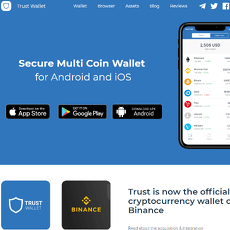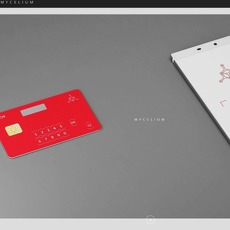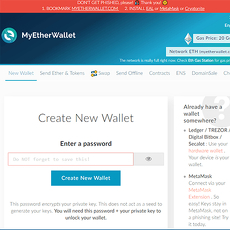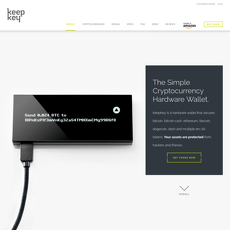Trezor Review
Trezor
trezor.io
Trezor Wallet Review 2025: Is Your Crypto Really Safe? Everything You Need to Know
Ever worried late at night, wondering if your crypto assets are truly secure? With billions of dollars worth of cryptocurrency stolen each year in cyber-attacks and scams, storing your hard-earned coins in a secure way has never been more crucial.
Maybe you've experienced that stomach-sinking feeling—seeing another crypto hack headline, thinking: Could it happen to me?
The truth is, losing crypto isn't like losing cash. There's no bank or authority that'll step in to reimburse you. Once your crypto is gone, it's usually gone forever. Imagine waking up one morning and discovering your digital savings has simply vanished—that's the nightmare scenario all crypto investors fear.
Why Choosing the Wrong Crypto Wallet Can Be Devastating
A wallet choice may seem straightforward at first. But what many don't realize is that not every hardware wallet guarantees the same level of protection. Hidden vulnerabilities, accidental drops or spills, or even simple software glitches can put your crypto at serious risk.
For example, remember the Ledger wallet vulnerabilities disclosed back in 2023? An otherwise secure device exposed user information, causing panic and distrust among thousands of crypto investors. Such cases prove that even devices widely accepted as safe can fail, and these failures come with very real consequences.
- Accidental Damage: physical damage like drops, spills, or water exposure can destroy a wallet, causing you to potentially lose access.
- Hidden Vulnerabilities: undisclosed faults could expose your private keys or sensitive user data to hackers.
- Software Glitches: bugs or update failures mean your wallet might unexpectedly fail right when you need it most.
The stakes are high—your crypto holdings and peace of mind both depend on the reliability of the hardware wallet you pick. So, is there a safer alternative you can trust?
But Don't Worry—There's a Solution
That's why Trezor wallets have become so popular among crypto enthusiasts. Often praised by experienced investors, beginners, and security experts alike, Trezor promises protection of your digital assets with easy-to-use hardware designed specifically to counter the biggest threats out there.
- Could Trezor genuinely boost your crypto security?
- Do benefits truly live up to what its users claim?
- Are there secret downsides you should know before investing your hard-earned money?
If safety, ease-of-use, and peace of mind are top priorities for you (as they should be!), keep reading. I'll uncover everything you really need to know about Trezor wallet. You'll soon be confident whether Trezor is the best way to secure your crypto holdings, or if there's something even better out there.
Ready to find out exactly how Trezor hardware wallets safeguard your crypto assets from hackers? Let's keep going and find out...
What Exactly Is a Trezor Hardware Wallet and How Does It Work?
Let’s face it, cryptocurrency can feel like the Wild West—exciting yet uncertain. You've probably thought, "Is my crypto truly safe?" The good news is, hardware wallets like Trezor exist to ease that worry, giving you something tangible to secure your digital coins. But how exactly does a Trezor wallet keep your precious crypto protected? Let's unpack this clearly, without getting overly technical.
Understanding Trezor: Quick Overview
Think of your digital wallet like your physical wallet. Just as you'd keep cash, IDs, and cards safe, your crypto needs secure offline storage. This is exactly what Trezor—a hardware wallet smaller than your average car key—does brilliantly. Unlike your phone or laptop, a hardware wallet stores your crypto keys away from any internet connection. This makes it incredibly tough for hackers to ever touch your digital assets.
Here's the simplified play-by-play:
- Your Trezor wallet generates and securely stores your private keys. These keys are essential for spending or moving your crypto. Lose them, and you lose your funds. So having them offline and highly encrypted is critical.
- When sending cryptocurrencies, Trezor quickly lets you physically confirm transactions right on the device, meaning even if your computer is compromised, your crypto still stays safe.
- It protects you from phishing scams because your private keys never leave the device—hackers simply can't trick your wallet into revealing secrets.
Here's what sets Trezor apart as one of the safest wallets today:
- Cold Storage Security: Fully offline storage of private keys (also called cold storage) greatly reduces hacking risks.
- Open-Source Software: Everything Trezor does is publicly available. Security experts and developers regularly check for weakness—that transparency leads to constant improvements.
- Pin & Passphrase Protection: If someone steals your physical device, there are additional layers of security with PIN codes and optional passphrases to prevent unauthorized access.
- Recovery Seed: Lose your wallet or device damaged? No worries—simply use your private seed phrase on another Trezor wallet, and your crypto returns safe and sound.
"Hardware wallets are considered the safest way to protect cryptocurrency from hackers and thieves, making devices like Trezor essential tools for crypto safety." — Security Expert Andreas Antonopoulos
Easy-to-Use for Beginners
If you've been putting off getting a hardware wallet because it sounds complex or intimidating, let me ease your mind: Trezor is designed specifically to make things beginner-friendly. Setting it up and using it daily requires virtually zero technical skills—think plug & play simplicity, clearly guided instructions, and an intuitive user interface.
For instance, you’ll easily connect your Trezor wallet to your computer via USB, follow simple on-screen visual prompts, and be ready within minutes—no complex commands, no confusing setup guides. Every step is smooth, straightforward, and explained clearly.
And when it comes to daily use transactions like sending or receiving Bitcoin or Ethereum, Trezor's clear interface and confirmations help you securely complete transactions without anxiety.
But here's the thing—no wallet is 100% bulletproof… Could Trezor have hidden vulnerabilities you should be aware of?
Wondering if Trezor truly stacks up against competition and protects from serious cybersecurity risks? Let's find out clearly in the next section…
Trezor Wallet Pros and Cons—Is It the Right Match for You?
If you've stuck around the crypto community for any significant time, you've probably heard folks swearing by Trezor wallets. But let's be real—nothing is perfect. Today, I'll walk you through the key advantages as well as some less obvious vulnerabilities of Trezor hardware wallets that you absolutely need to know before you put your crypto assets at stake.
The Good: Trezor Wallet's Key Advantages
Here’s why crypto enthusiasts and beginners alike trust their coins with Trezor:
- Top-notch Security: From strong cryptographic protocols to built-in PIN protection and seed recovery, Trezor has continuously proven itself powerful enough to protect you from online hacks and theft.
- Transparent, Open-Source Approach: Got trust issues? No problem. Trezor's architecture is fully open-source. Meaning, anyone—yes, even you—can check out their codebase personally, making sneaky backdoors or tracking spyware virtually impossible to hide. Transparency really does build trust in crypto!
- Super-Friendly UI: Even if you're a total crypto newbie, Trezor's straightforward interface simplifies complicated processes. Setting up, sending transactions, or backing up your wallet feels easy and stress-free.
- Huge Crypto Support: Bitcoin, Ethereum, Litecoin, XRP—you name it. Chances are, Trezor stores it securely. With over a thousand crypto types supported, you’ll rarely run into compatibility roadblocks.
- Strong Community Reputation: Ask around crypto chat groups or Reddit threads, and you'll catch tons of happy users vouching enthusiastically for Trezor’s reliability and level-headed support team.
That's some impressive firepower helping you sleep worry-free, right?
The Not-So-Good: Common Disadvantages of Trezor
But before you jump straight into purchasing—let’s pause and consider some real-world vulnerabilities uncovered by respected voices in the crypto hardware community.
- Hardware Vulnerabilities: According to Ledger's cybersecurity report cited on Mitrade’s analysis, some Trezor hardware models have shown cryptographic microcontroller weaknesses. While these issues aren't typically severe enough to be widely exploited remotely, attackers with direct device access and sophisticated techniques can theoretically expose your seed phrase.
- Physical Access Risks: Your Trezor wallet is safe from online attacks—true—but if someone physically gets hold of your wallet, theoretically, with advanced methods, data recovery becomes possible. Not your everyday theft scenario, sure, but still worth noting.
- No Native Mobile App: Face it—these days, convenience matters. As crypto grows increasingly mobile-focused, the lack of a dedicated Trezor wallet mobile app means extra steps for users who love managing crypto directly from their smartphones or tablets.
- Small Screen, Big Headaches (on Trezor One): The entry-level Trezor One model has a pretty tiny screen, making longer addresses or entering your PIN cumbersome and prone to errors sometimes—especially for folks with larger hands or less patience.
"The best security system is the one you actually use." – Anonymous cybersecurity expert
This quote brings up an important point: While Trezor's strong points far outweigh its disadvantages for most users, it still matters that your hardware wallet matches your daily routine comfortably. Don't overlook these inconveniences—they can turn minor issues into major frustrations over the long run.
But now, let’s cut to something everyone questions (even secretly). What about privacy, taxes, and tracking—could your Trezor wallet reveal everything to the IRS and other prying eyes? Curious? Stick around—I promise to cover exactly how Trezor handles that sensitive concern coming right up!
Common Questions People Ask About Trezor Wallet
Got questions spinning in your head about Trezor wallets? I've got straight answers for you. Let's look into two queries everyone seems eager to know about—answers that'll clear up some serious confusion.
Does Trezor Wallet Report My Transactions to the IRS?
Listen, I've heard this plenty from readers: "Will Trezor tell the IRS about my crypto transactions?" Here's the honest deal—Trezor itself won't report your crypto activity to the IRS (or anyone else, for that matter).
Trezor simply offers you secure hardware to store and manage your cryptocurrencies privately. They don’t collect or share your transaction data with tax authorities. But—and it's a big but—all cryptocurrency transactions live publicly forever on the blockchain. Tools like the Crypto Tax Calculator explain it clearly: tax authorities and compliance tools can analyze blockchain transactions to cross-reference or track your transfers.
"Blockchain transactions are permanently recorded and publicly visible. Your wallet may provide privacy, but transparency on the blockchain isn't something you can control entirely." – Crypto Tax Calculator
So, while Trezor won't directly spill your transactions to the government, always remember that your crypto moves leave digital footprints on the blockchain—visible for anyone savvy enough to look.
Where's the Safest Spot to Buy an Authentic Trezor Wallet?
Another common panic-point readers share is: "I don't want to buy a fake Trezor—where do I securely purchase one?" I totally understand that worry, considering all the scams and sketchy knock-offs you might run into online.
Your safest bet is always purchasing directly from the official Trezor store (trezor.io). That's your absolute safest option to guarantee authenticity. Official Amazon listings from the Trezor company are another secure alternative. Never trust unofficial third-party sellers, random online marketplaces, or resale sites promising cheaper deals; you might end up with a fake or tampered hardware wallet.
- Best place: Official Trezor store (trezor.io).
- Second-best: Verified official Trezor listings on Amazon.
- Avoid at all costs: Unofficial resellers, random marketplace listings, or sites that lack official badges or verification.
Let’s face it—the peace of mind knowing your wallet hardware is genuine makes this small extra step worth every penny.
But speaking about genuine Trezor wallets—are all Trezor models equally secure and reliable? Stick around to uncover key differences between Trezor One, Trezor Model T, and the new Trezor Safe 3. Could your choice affect your financial security? Let's find out next.
Comparing Trezor Models: Trezor One vs. Trezor Model T vs. Trezor Safe 3
If you're getting serious about keeping your crypto secure, you've probably heard about the different Trezor wallet options—but figuring out exactly which one suits you best is not always easy. After all, every crypto user has unique priorities and needs when it comes to hardware wallets. Let's see how these three popular models stack up, and which one might match your investment strategy.
Trezor One: Budget-Friendly and Reliable
"Simplicity is the ultimate sophistication."—Leonardo Da Vinci
Ever heard the expression that sometimes less is more? Well, that probably sums up the Trezor One perfectly. It's minimalistic yet robust and has become the go-to option for thousands of crypto enthusiasts looking for solid protection without breaking the bank.
Who might benefit from Trezor One?
- Crypto beginners looking to dip their toes gently into hardware wallets
- Budget-conscious traders and HODLers wanting great security without advanced bells and whistles
- Owners of major coins such as Bitcoin, Ethereum, Litecoin, and other supported tokens that don't require advanced features or fancy aesthetics
This affordable model is recognized for its reliability without unnecessary complexity, making it ridiculously simple to secure your assets. However, keep in mind its basic button-based interface could feel limiting if you're after an ultra-modern vibe.
Trezor Model T: Advanced Features & Touchscreen Convenience
"Innovation distinguishes between a leader and a follower."—Steve Jobs
If the Model One sounds a bit basic for your taste, the Model T might be more your style. Trezor Model T steps up your security experience with a sleek color touch screen, smoother interface, and additional cryptocurrency support like Ripple (XRP), Cardano (ADA), and Monero (XMR).
Who would benefit most from going for Trezor Model T?
- Crypto power users who regularly interact with multiple cryptocurrencies and smart contracts
- Professionals and serious investors who appreciate premium user experience and additional convenience
- Anyone looking for extra security, usability, and more sophisticated privacy features
In a nutshell, if the higher price isn't an issue for you, and you value a user-friendly navigation experience combined with an extended feature set, the Trezor Model T could be the winner.
The New Trezor Safe 3 and Potential Issues
This newest kid on the Trezor block, Safe 3, grabbed the spotlight for good and not-so-good reasons. Sure, the hardware is attractive—streamlined, optimized, and promoted as next-level security—but potential downsides have recently surfaced, making it crucial to carefully examine the reports before purchasing.
As pointed out in a detailed security analysis highlighted by Mitrade's crypto security article, Ledger had reported vulnerabilities relating to cryptographic microcontrollers, raising questions about hardware-level security in the Safe 3. While Trezor acknowledges and is actively addressing these vulnerabilities, it's critical not to overlook such concerns when deciding if the Safe 3 is your crypto guardian angel or just a shiny marketing distraction.
Who's the Safe 3 ideal for?
- Early adopters who crave the newest, cutting-edge technologies in crypto security
- Tech-oriented users who enjoy being part of hardware wallets' advancements and enhancements
- Users comfortable keeping updated and regularly following official Trezor reports on software updates and security patches
In the rapidly evolving cryptocurrency landscape, hardware wallets continuously develop and adapt. So, do you feel confident you've chosen the perfect model for your needs, but unsure how to squeeze maximum security from it or perhaps want tips from an insider?
Keep reading, as I'll cover some brilliant tips and hidden tricks to enhance your Trezor wallet's security and usability, helping you sleep soundly at night, knowing your valuable crypto assets are safely secured.
Tips and Tricks: Making The Most Out of Your Trezor Wallet
No wallet, no matter how secure, will stay safe if you don't use it properly. Don't stress—I've learned all the best shortcuts, hidden settings, and critical security practices that can help you squeeze every ounce of protection and convenience from your Trezor wallet.
"An ounce of prevention is worth a pound of cure" – Benjamin Franklin
You probably hear stories all the time: someone loses crypto simply because they skipped one tiny step or ignored a security setting. I believe nobody should face that pain—that feeling like a stomach punch when you realize you’ve lost your crypto for good.
Luckily, I've gathered some practical, actionable tips that any Trezor wallet owner can follow to step up security and make their crypto management hassle-free.
Top Security Practices Every Trezor Owner Should Follow
- Always Keep Your Firmware Updated: Whenever Trezor releases updates, they often patch new security weaknesses discovered by leading crypto-security firms. An old firmware might have critical gaps, so updating regularly is your first line of defense. According to research by security experts at Kraken, devices with regular firmware updates had drastically reduced vulnerability threats.
- Use a Strong PIN and Passphrase: Your wallet's PIN is the main key to unlocking it physically. Don't use easily guessable sequences like "123456" or birthdays. On top of your PIN, enable the hidden wallet or passphrase feature Trezor provides. It adds another strong layer of protection even if your device falls into the wrong hands.
- Store Your Seed Phrase Carefully: Writing down your recovery seed is great—but only if you store it safely and offline. Consider investing in a metal seed-phrase backup tool to protect it from fires and floods. Never photograph or digitally store them. I’ve met dozens of users who've lost significant amounts of crypto because they ignored this step; trust me, you don't want to join their ranks.
- Physically Secure Your Trezor: Keep it locked up—seriously. Consider using a secure drawer or safe. A hardware wallet is no good if someone physically steals it. It's simple logic, but you'd be surprised how many people leave their wallets casually lying around.
Hidden Features & Tricks to Improve Your Trezor Experience
- Use Trezor Suite's Privacy Mode: When checking balances in public or around people, activating Privacy Mode blurs out your balances so prying eyes can't peek. It seems minor, but it's a big deal when protecting your financial privacy.
- Custom Home Screen & Labeling: Did you know you can customize your Trezor device's home screen with a personalized image or logo? You can also use labels to clearly identify different wallets directly through Trezor Suite. It's a minor touch—but it dramatically simplifies wallet management for heavy crypto users.
- Trezor's Hidden Wallet Feature: This underrated gem allows you to create "hidden wallet" accounts behind an additional passphrase. Even if someone can access your main wallet, your hidden wallets remain invisible unless the correct extra passphrase is used. It's a clever safety measure that could save you big time.
- Two-Factor Authentication via Trezor: Did you know your Trezor device can also serve as a U2F authenticator (similar to a YubiKey)? Using it as a secure way to authenticate popular services like Google, GitHub, or Facebook gives you additional utility beyond crypto storage.
I know firsthand how powerful it is to be fully in control of your crypto assets. Carefully followed security habits combined with these smart hidden features massively upgrade your Trezor wallet experience. But honestly, even if you do everything right, there’s still an enemy lurking around the corner, waiting for one careless moment to strike: scammers and fraudsters.
The question is: Are you ready to recognize and avoid scams before they hit you? Don't worry—I’m about to show you exactly how to dodge the most common Trezor scams that trap thousands every year. Let's keep your crypto safe together.
Avoiding Common Scams and Pitfalls With Your Trezor Wallet
"The saddest thing about betrayal is that it never comes from your enemies—it comes from those you trust."
The cryptocurrency world is full of opportunities but, unfortunately, also filled with crafty scammers eager to exploit smart investors like you. Even Trezor users, known for choosing one of the safest wallets, aren't immune to the wave of crypto scams out there. But don't let that scare you—knowledge is your most powerful weapon here. Let's quickly walk through the most common pitfalls and scams targeted directly at Trezor wallet users and look at clear, practical ways you can avoid becoming their next victim.
Recognizing & Avoiding Fake Trezor Devices
Buying a fake Trezor wallet isn’t just frustrating—it's financially devastating. Scam resellers and fake websites often claim discount prices or "special offers" for Trezor devices to lure unsuspecting buyers. Once you unwrap these fake gadgets, it's already too late—your crypto assets are at risk from hidden malware or compromised software.
Here’s how to make sure you never receive a counterfeit Trezor:
- Only Buy from Official Channels: Stick exclusively to the official Trezor website or verified sellers. Avoid marketplaces known for knockoffs or suspiciously cheap prices.
- Check the Packaging & Security Hologram: Genuine Trezor devices from official sellers always come sealed with a tamper-proof holographic sticker or seal. A missing or broken seal is a red flag.
- Inspect Device Authenticity Upon First Use: Official Trezor software automatically checks device authenticity. If anything looks different or suspicious, don't input your seed phrase, and immediately contact the official Trezor support.
I remember reading about a Reddit user who bought a cheap Trezor wallet from a shady reseller, thinking he'd scored a great deal. Within weeks, the fake device used hidden malware to steal his entire crypto stash—gone overnight. You definitely don't want this nightmare on your hands!
Phishing Emails and Trezor: Stay Secure Online
The most common attack against Trezor wallet users comes through sneaky phishing emails. Fraudsters pretend to be legitimate Trezor customer support agents, sending official-looking emails claiming activities like software updates, compromised accounts, or suspicious transactions. Before you realize what's happening, you accidentally share your secret recovery phrase or private seed, and boom—your crypto is no longer yours.
These are quick, practical ways to recognize and defend yourself against phishing scams:
- Double-Check the Sender's Email Address: Scam emails typically use official-sounding domains that look slightly off ("support-trezor.io" instead of "trezor.io"). Always hover or click “reply” without responding to inspect the domain.
- Beware of Scary, Time-Sensitive Emails: Phishing emails often use fear tactics or urgency—for instance, "Your wallet will be blocked if you don't verify immediately." Chill out, step away, and carefully verify authenticity before engaging.
- Never Share Your Recovery Seed or Keys: Real Trezor staff NEVER ask you for recovery words or private keys, no matter the situation. If anyone demands your seed phrase or keys via email or chat, block them immediately.
A friend of mine once almost fell victim because the scammers sent a super convincing "urgent wallet update" email—which, luckily, they double-checked on the Trezor support website before losing anything.
Feeling more confident about keeping your crypto away from thieves? Good—but there's still a treasure chest full of resources waiting for you. Curious where to get ongoing expert assistance, reliable community advice, or even more insider tips directly about your Trezor wallet? Well, buckle up—I'll show you exactly where to find that and more in the next section!
Additional Resources for Safe & Effective Trezor Use
You've come a long way towards securing your crypto journey, but what if you have questions or need extra guidance along the way? Trust me, being proactive about understanding your Trezor hardware wallet is critical—and thankfully, there are some fantastic resources you can tap into.
Official Trezor Support: Reliable Answers at Your Fingertips
If you're ever unsure about something or encounter a hiccup, the official Trezor Support is your best ally. I've personally found their guides clear, simple, and straightforward. No cryptic jargon, just straightforward troubleshooting and quick solutions. Definitely bookmark this page to stay prepared for every situation.
"The more prepared you are, the less you'll worry—that's how trust and reliability in crypto wallets grow."
Interact Directly With Other Trezor Users in Official Forums
Sometimes, you'll want real-world experiences and advice from other crypto enthusiasts who've faced exactly the same dilemmas. That's where the official Trezor forums shine. It’s like having thousands of experienced crypto-friends ready to jump in and help out.
If you're skeptical or stuck, just drop your question in the forum. Usually, you’ll get a response or solution quickly—often faster than contacting regular customer support! It's all about community trust and collective crypto wisdom. Don't skip this resource.
Trezor’s Official Reseller List: Why Buying From Verified Sources Matters
Fake devices and scammy resellers are constantly lurking out there—and trust me, you don't want your wallet compromised from day one. Always double-check before you buy a Trezor hardware wallet: the safest route is right from the official Trezor reseller list. Whether it’s Amazon or another site, always confirm it's officially sanctioned by Trezor to avoid costly mistakes and fraudulent sellers.
Tackle Your Crypto Taxes With Confidence: Crypto Tax Calculator
Handling crypto taxes can become messy quickly. To make your life easier, give Crypto Tax Calculator a try—this handy tool clearly and quickly generates the reports you'll need to simplify tax season. Since your Trezor wallet itself doesn't track taxes, pairing this tool with your wallet data makes a perfect crypto combo—trust me on this one.
Ready to Decide?
Now you have powerful tools and resources right at your fingertips—and staying informed and prepared is half the battle for crypto-security. But the biggest question remains: Is Trezor really the perfect wallet for your cryptocurrency needs, or are you better off exploring other options?
Let's determine that once and for all—read on, and I'll help you find the right answer.
Is Trezor Wallet Really Worth It—Should You Buy One?
Alright, let’s cut straight to the chase—after all we've explored, is a Trezor wallet truly your crypto savior, or should you shop around for something else?
Who Will Benefit Most From a Trezor Wallet?
If you’re someone who worries about crypto safety and values reliable, battle-tested security, Trezor was probably made just for you.
- Crypto Newbies: Trezor’s user-friendly setup process makes life so much easier if you're just dipping your feet into crypto waters. No complicated tech skills needed—I promise.
- Serious Hodlers: Stack sats? Got a sizeable portfolio? Trezor’s known for rock-solid security, transparent open-source code, and a history of community trust. You can sleep easier knowing your digital gold bars are safe behind hardware-grade security rather than just a software wallet.
- Privacy-Oriented Investors: If privacy matters, you'll love that Trezor never records or stores your transactions. All transaction data stays on the blockchain, away from company servers or third-party hands.
In short, for safety-conscious, privacy-focused users (and especially beginners), Trezor is a smart, secure buy.
Who Should Look for Alternatives?
However, Trezor isn’t perfect for everyone. Let’s keep things painfully real—there are users out there who’d do better elsewhere.
- Very Tight Budgets: If you're on a razor-thin budget, spending around $70–$200 on a wallet might hurt your wallet (pun intended). Cheaper alternatives do exist (but be cautious!).
- Crypto Day-Traders: Making multiple frequent moves daily? A hardware wallet might slow down your workflow, as hardware wallets sacrifice some ease-of-access for added security. A securely configured hot wallet setup might suit daily traders better.
- Fans of Integrated dApps or NFTs: While Trezor offers some support, advanced NFT management and seamless DeFi browser experience aren’t their strongest suits yet. Wallets like MetaMask or Ledger could offer more integrated experiences for Web3/DApp enthusiasts.
The Bottom Line: Should You Get a Trezor Wallet?
Here’s my no-nonsense, friend-to-friend truth: For most crypto users looking for peace of mind, a user-friendly setup, and proven security, a Trezor remains one of your best options.
Sure, it's not flawless—vulnerabilities like those mentioned in the Ledger report (as we discussed earlier) remind us that no security is 100% airtight. Still, Trezor reacts openly and quickly when security issues surface, staying transparent, accountable, and proactive. That level of openness is rare and reassuring in crypto-land.
My honest advice? If security, privacy, and peace of mind matter most for your hard-earned crypto stash, Trezor wallets absolutely live up to the hype. Almost every credible crypto holder or expert I know personally owns one—or two.
But if your crypto lifestyle is more about frequent rapid-fire trades or deep in-the-weeds NFT/DApp action, you might want to at least peek at alternatives or additional wallet solutions to support your style.
Always remember—no single wallet is perfect. The strongest crypto fortress involves using a blend of solutions and good security habits. Trezor just happens to be one highly trustworthy cornerstone in that security puzzle.
Stay savvy, stay protected, and happy crypto journey!













